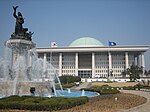Gukhoe
| emblem | Gukhoe building |
|---|---|

|

|
| Basic data | |
| Seat: | Seoul |
| Legislative period : | 4 years |
| MPs: | 300 |
| Current legislative period | |
| Last choice: | April 15, 2020 |
| Chair: | Speaker of Parliament Moon Hee-sang ( 문희상 ) ( Independent ) |
| Distribution of seats: |
|
| Website | |
| www.assembly.go.kr | |
| Korean spelling | |
|---|---|
| Korean alphabet : | 국회 |
| Hanja : | 國會 |
| Revised Romanization : | Gukhoe |
| McCune-Reischauer : | Kukhoe |
Gukhoe ( Korean 국회 ) is the National Assembly of the Republic of Korea (South Korea). The parliament consists of a unicameral and has 300 members who are in a grave electoral system are determined by two votes. 246 members are directly elected in single- seat constituencies in a simple majority vote, the remaining 54 seats are allocated in proportional representation according to the votes cast for party lists, whereby a threshold clause applies. Only party lists that have won at least three percent of the votes or five direct seats can win proportional representation mandates.
Competencies
The basic provisions for the work of the gukhoe are laid down in Chapter III of the Constitution . After that it is the sole holder of legislative power and ratifies international treaties. It also has the right to set up committees of inquiry, cast no-confidence votes against the Prime Minister or individual ministers in the Council of State and, with a two-thirds majority, to have the President ousted. It cannot be resolved.
The gukhoe must have at least 200 members elected for four years; the electoral law regulates more precisely. MEPs enjoy immunity and indemnity .
The regular session is 100 days a year. Extraordinary meetings of a maximum of 30 days take place at the request of the President or at least a quarter of the MPs.
Legislation and Budget
The government or at least ten members of parliament have the right of initiative for bills. Before taking a decision, they usually go through one of the 17 standing committees . The budget must be presented to the gukhoe for consultation at least 90 days before the start of the financial year.
Constitutional amendments
Proposals for constitutional changes can be initiated by the President or a majority of the MPs. If at least two thirds of the gukhoe agree, the constitutional amendment will be submitted to the people for a vote in a referendum.
Last election and current composition
The National Assembly is currently composed as follows:
| Political party | Abbreviation | kor. Surname | German designation | Alignment | Party leader | Seats | |
|---|---|---|---|---|---|---|---|
| Deobureo minju party | DMP | Deobureo-minju-dang ( 더불어 민주당 ) | Joint Democratic Party | social liberal | Lee Hae-chan ( 이해찬 ) | 120 | |
| Mirae tonghap party | MTP | Mirae-tonghap-dang ( 미래 통합 당 ) | United Future Party | conservative | Hwang Kyo-ahn ( 황교안 ) | 92 | |
| Minsaeng party | MSP | Minsaeng-dang ( 민생 당 ) | Party for people's livelihood | liberal - centrist |
Yu Sung-yup ( 유성엽 ) Park Joo-hyun ( 김정화 ) |
20th | |
| Mirae hanguk party | MHP | Mirae-hanguk-dang ( 미래 한국당 ) | Korea Future Party | conservative | Won Yoo-chul ( 원유철 ) | 20th | |
| Deobureo shimin party | DSP | Deobureo-shimin-dang ( 더불어 시민 당 ) | Common party of citizens | social liberal |
Woo Hee-jong ( 우희종 ) Choi Bae-geun ( 최배근 ) |
8th | |
| Jeongui party | JP | Jeongui-dang ( 정의당 ) | Justice party | Left | Sim Sang-jung ( 심상정 ) | 6th | |
| Uri Gonghwa Party | UGP | Uri-gonghwa-dang ( 우리 공화당 ) | Our Republican Party | right-wing conservative | Cho Won-jin ( 조원진 ) | 2 | |
| Minjung party | MGP | Minjung-dang ( 민중당 ) | People's Party | Left |
Kim Jong-hoon ( 김종훈 ) Kim Chang-han ( 김창한 ) |
1 | |
| Gungminui party | GP | Gungminui-dang ( 국민 의 당 ) | Citizens' Party | centrist | Ahn Cheol-soo ( 안철수 ) | 1 | |
| Chin Park shin party | CPP | Chin-Park-shin-dang ( 친박 신당 ) | New Pro-Park Party | right-wing conservative ; pro Park Geun-hye | Hong Moon-jong ( 홍문종 ) | 1 | |
| Hanguk gyeongje party | HGP | Hanguk-gyeongje-dang ( 한국 경제 당 ) | Korea Economic Party | conservative |
Choi Jong-ho ( 최종호 ) Lee Eun-jae ( 김경세 ) |
1 | |
| Yeollin minju party | YMP | Yeollin-minju-dang ( 열린 민주당 ) | Open Democratic Party | social liberal | Lee Keun-shik ( 이근식 ) | 1 | |
| Independent | 17th | ||||||
| Vacant | 10 | ||||||
| total | 300 | ||||||
literature
- Hannes B. Mosler: The electoral system of South Korea . In: Country Report Korea . Federal Agency for Civic Education, Bonn 2015, ISBN 978-3-8389-0577-8 , Chapter: Part B: South Korea - I. Political System, p. 129-144 .
Web links
- Homepage . The National Assembly of the Republic of Korea,accessed January 17, 2018(Korean).
- Homepage . The National Assembly of the Republic of Korea,accessed January 17, 2018.
Individual evidence
- ^ Mosler: The electoral system of South Korea . In: Country Report Korea . 2015, p. 129 f .
- ↑ Claire Horst: Gukhoe, the home of eloquent debates. In: The Parliament. The German Bundestag, 2010, accessed on January 17, 2018 .
- ^ Members by negotiation group. National Assembly of Korea website. Retrieved April 12, 2020.

